Addiction Therapy: Definition, Types, Alternative Treatment
Addiction therapy is a structured form of treatment designed to help individuals overcome substance use disorders by addressing the psychological, emotional, and behavioral aspects of addiction. It involves evidence-based interventions that guide individuals through recovery, improve mental health, and reduce the risk of relapse. Unlike short-term solutions, addiction therapy provides long-term strategies for coping with triggers and rebuilding a healthy, substance-free life.
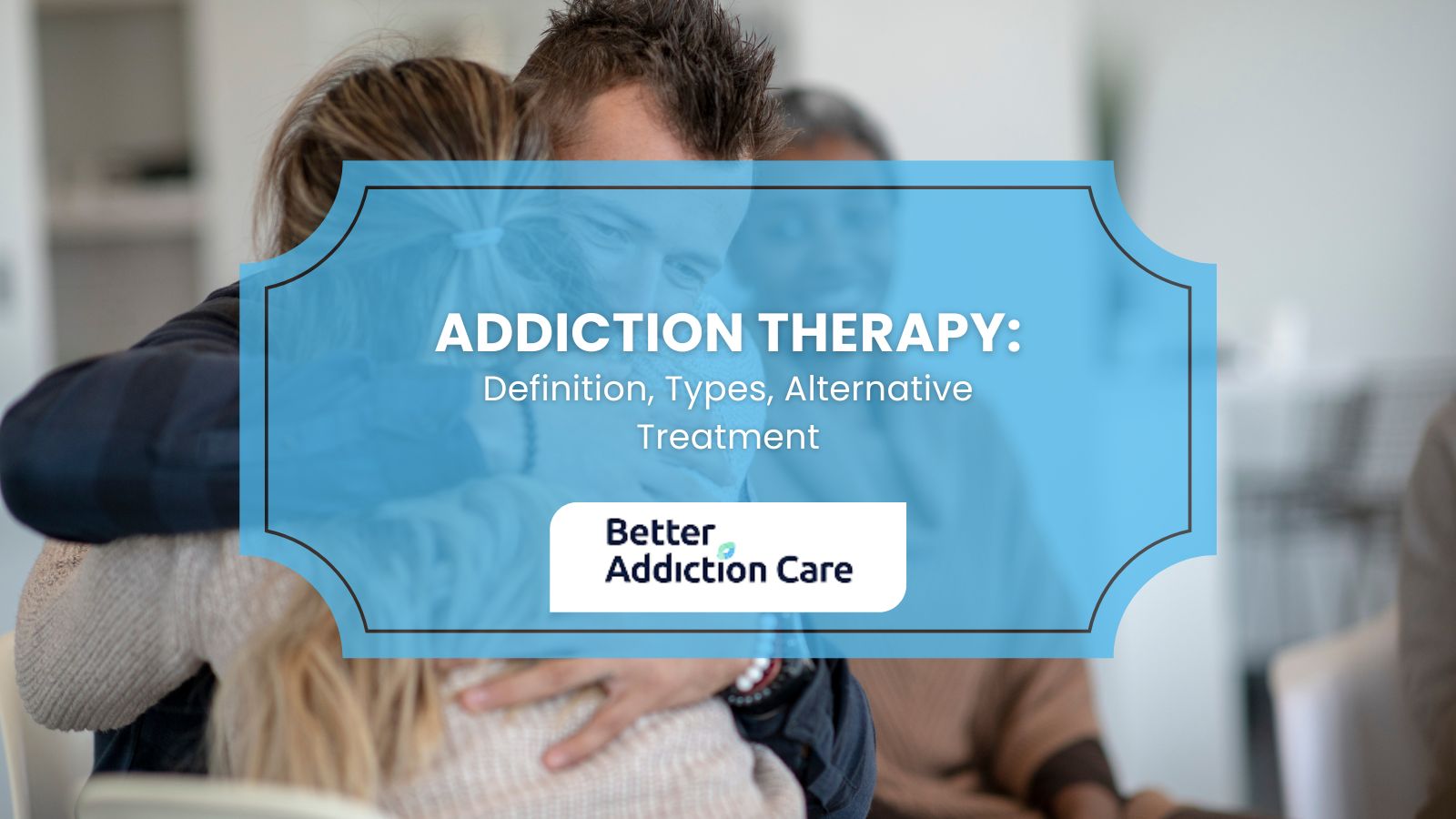
Addiction therapy is a structured form of treatment designed to help individuals overcome substance use disorders by addressing the psychological, emotional, and behavioral aspects of addiction. It involves evidence-based interventions that guide individuals through recovery, improve mental health, and reduce the risk of relapse. Unlike short-term solutions, addiction therapy provides long-term strategies for coping with triggers and rebuilding a healthy, substance-free life.
There are several types of addiction therapy, each tailored to meet different needs and recovery stages. These include individual therapy, group therapy, cognitive behavioral therapy (CBT), dialectical behavior therapy (DBT), family counseling, and trauma-informed care. The National Institute of Mental Health in 2022 confirms that CBT offers significant improvements in 70–80% of patients with co-occurring addiction and mental health disorders. Each method is designed to explore the root causes of addiction, change harmful thought patterns, and support emotional healing.
Medication Assisted Therapy (MAT), which combines medications like methadone or buprenorphine with counseling, has success rates ranging from 60% to 90% for opioid addiction. It significantly reduces relapse rates and overdose deaths according to the National Institute on Drug Abuse (NIDA), "Principles of Drug Addiction Treatment."
In addition to traditional therapy, alternative treatments are available for those seeking a more holistic approach. These include mindfulness practices, meditation, yoga, art therapy, music therapy, acupuncture, and equine-assisted therapy. While these alternatives do not replace clinical care, they complement therapy by promoting emotional balance, stress relief, and personal growth throughout the recovery process.
What Is Addiction Therapy?
Addiction therapy is a comprehensive treatment approach designed to help individuals overcome substance use disorders by addressing the behavioral, psychological, and medical aspects of addiction. Behavioral interventions, such as cognitive-behavioral therapy (CBT) and motivational interviewing (MI), focus on modifying harmful behaviors and thought patterns associated with substance use.
Psychological interventions aim to uncover and treat underlying mental health issues contributing to addiction, including anxiety and depression. Medical interventions involve the use of FDA-approved medications to manage withdrawal symptoms, reduce cravings, and prevent relapse.
What Happens During an Addiction Therapy Session?
During an addiction therapy session, individuals will work with a therapist on different ways to adjust their thought patterns and coping mechanisms. An addiction therapy session provides a structured environment where individuals work with trained professionals to address the complexities of their substance use disorder.
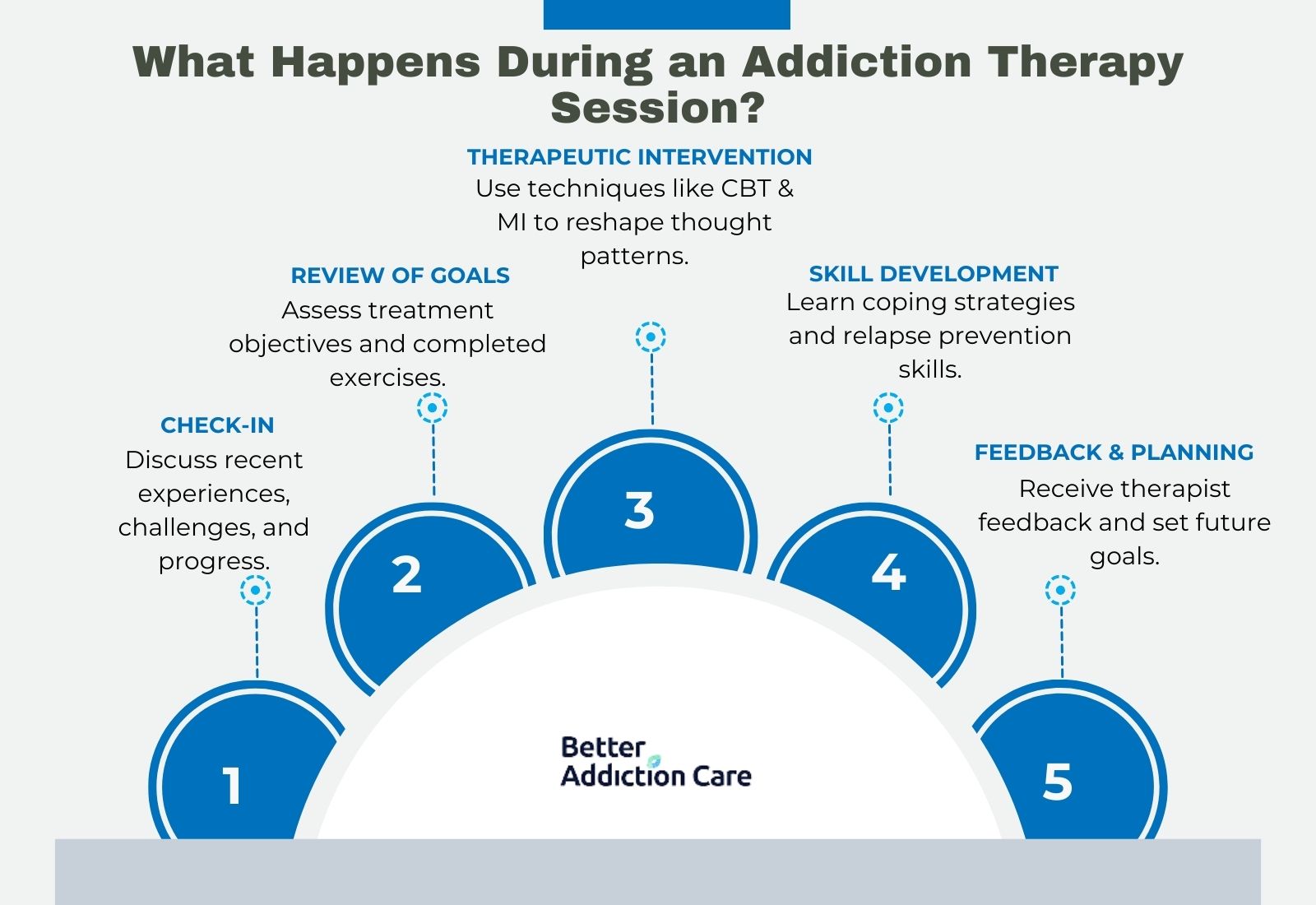
Typical Process of an Individual Therapy Session:
-
Check-In: The session begins with the therapist and client discussing recent experiences, challenges, and progress since the last meeting.
-
Review of Goals: The therapist revisits the individual's treatment objectives and any assignments or exercises completed between sessions.
-
Therapeutic Intervention: The core of the session involves engaging in specific therapeutic techniques tailored to the individual's needs, such as CBT to identify and alter negative thought patterns or MI to enhance motivation for change.
-
Skill Development: The therapist introduces and practices coping strategies, stress management techniques, and relapse prevention skills with the client.
-
Feedback and Planning: The session concludes with the therapist providing feedback, summarizing key points, and collaboratively setting goals or assignments for the next session.
What Are the Types of Addiction Therapy?
The types of drug addiction therapy are structured approaches that address the emotional, behavioral, and psychological components of substance use disorders. These therapies support individuals through all stages of recovery, from early motivation to long-term relapse prevention.
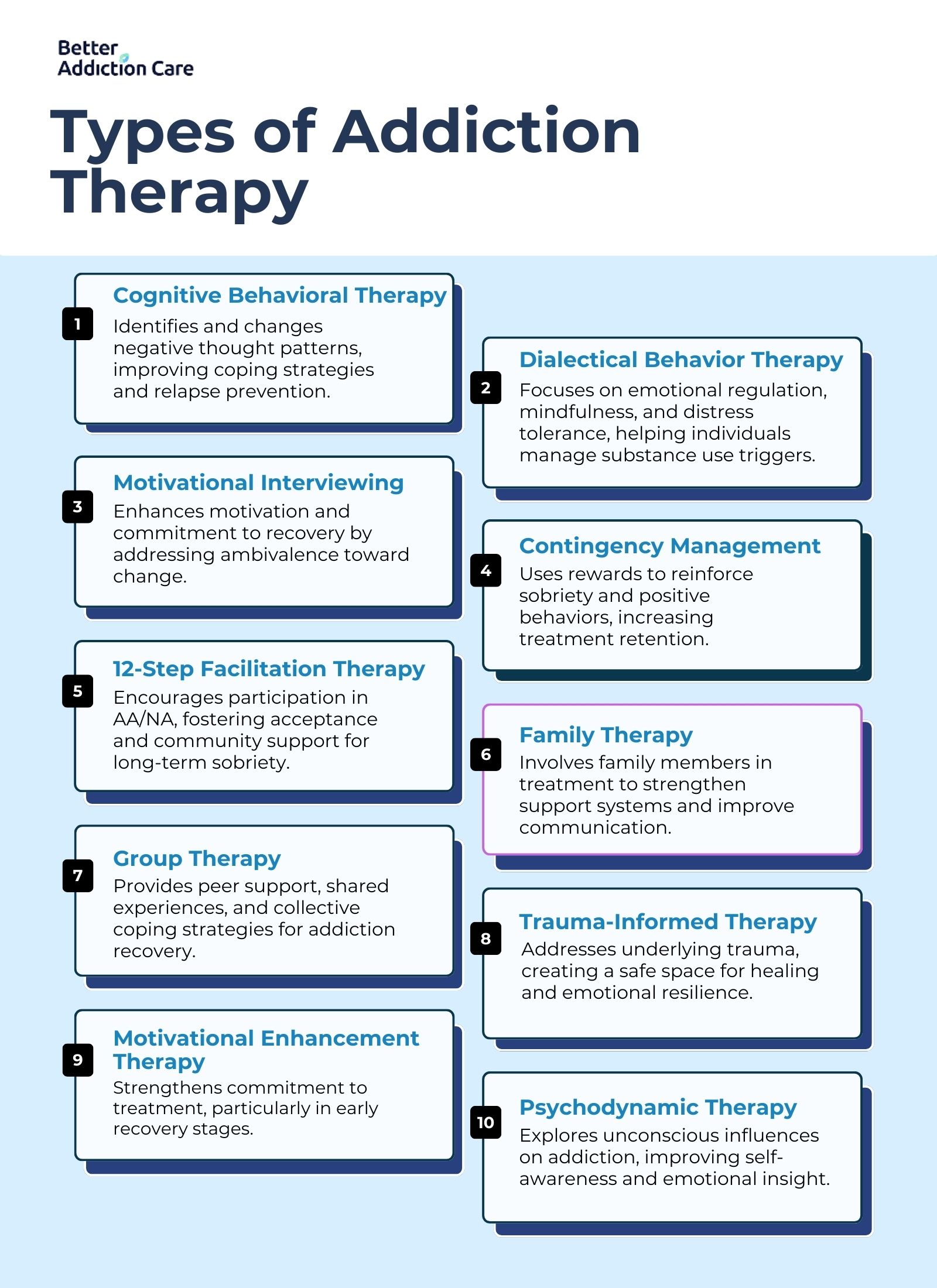
Below are some of the most widely used and effective forms of addiction therapy:
Cognitive Behavioral Therapy (CBT)
CBT is a widely utilized, evidence-based approach that helps individuals identify and modify negative thought patterns and behaviors associated with addiction. By developing coping strategies, patients better manage triggers and prevent relapse. According to NIDA, "Therapies for Substance Use Disorders." approximately 40-60% of individuals undergoing cognitive behavioral therapy for substance use disorders show significant improvements in reducing substance use and related behaviors.
Dialectical Behavior Therapy (DBT)
Originally developed for borderline personality disorder, DBT has been adapted to treat substance use disorders by focusing on emotional regulation, distress tolerance, mindfulness, and interpersonal effectiveness. In a study by Harned et al., 87.5% of individuals with substance dependence who received DBT achieved full remission for at least four weeks, compared to 33.3% in the comparison group receiving treatment by experts according to Behavioral Tech, "Dialectical Behavior Therapy for Substance Use Disorders"
Motivational Interviewing (MI)
MI is a client-centered counseling style aimed at enhancing motivation to change by exploring and resolving ambivalence. It is particularly effective in engaging individuals in treatment and fostering commitment to recovery. According to Karlsen, K. et. al. 2011 in "Motivational interviewing for substance abuse" published by the Cochrane Library, MI showed a significant effect on reducing substance use, with a standardized mean difference (SMD) of 0.79 (95% CI 0.48 to 1.09) at post-intervention. However, the effect weakened at short follow-up (SMD 0.17, 95% CI 0.09 to 0.26) and medium follow-up (SMD 0.15, 95% CI 0.04 to 0.25).
Contingency Management (CM)
CM is a behavioral therapy that provides tangible rewards to reinforce positive behaviors, such as maintaining sobriety. This approach has been effective in promoting abstinence and treatment adherence. CM significantly improves treatment retention, with 49% of participants completing 12 weeks of treatment compared to 35% in standard care groups, according to Petry, N et. al. 2011 in "Contingency Management: What It Is and Why Psychiatrists Should Use It".
12-Step Facilitation Therapy
This approach encourages individuals to engage with 12-step programs like Alcoholics Anonymous (AA) or Narcotics Anonymous (NA). It emphasizes acceptance, surrender to a higher power, and active participation in group meetings. According to PMC, "Effectiveness of Compulsory Drug Treatment."Abstinence-based programs like Alcoholics Anonymous show varying success rates, with studies indicating that 45% of participants maintain sobriety after one year showing that involvement in 12-step programs is associated with increased abstinence rates and improved psychosocial functioning.
Family Therapy
Family therapy involves the participation of family members in the treatment process to address systemic issues and improve communication. It recognizes the impact of addiction on the family unit and aims to strengthen support systems. Family therapy leads to better treatment engagement and outcomes. Family or couples therapy leads to a greater decrease in substance use compared to non-family approaches, with an effect size of 0.48 (p<0.01). This benefit is observed in both adults (effect size 0.42, p<0.01) and adolescents (effect size 0.39, p<0.01) according to BMJ Mental Health, "Family or couples therapy is more effective than non-family therapy for drug abuse" in 2025.
Group Therapy
Group therapy provides a supportive environment where individuals share experiences, gain insights, and develop coping strategies. It fosters a sense of community and reduces feelings of isolation. Studies have demonstrated that group therapy is as effective as individual therapy in treating substance use disorders. According to a study by Weiss et al., 2005, “Group Therapy for Substance Use Disorders: A Treatment Improvement Protocol,” group therapy improves recovery rates by up to 50%.
Trauma-Informed Therapy
This therapeutic approach recognizes the prevalence of trauma in individuals with substance use disorders and integrates this understanding into treatment. It aims to create a safe environment that promotes healing and empowerment. A systematic review found that trauma-informed interventions significantly reduced PTSD symptoms in 11 out of 23 studies, with additional improvements noted in depression and anxiety symptoms according to “Trauma informed interventions: A systematic review” by Han, H. et. al. 2021 by PLOS ONE.
Motivational Enhancement Therapy (MET)
MET is a brief, client-centered intervention designed to enhance motivation for change and strengthen commitment to treatment. It is particularly useful in the early stages of treatment to increase engagement. According to Hammarberg, S. et. al. 2023 published by Addiction Science and Clinical Practice Motivational Enhancement Therapy (MET) has demonstrated effectiveness in treating alcohol use disorder (AUD). For example, Project MATCH, a large-scale study, found that MET led to significant reductions in alcohol consumption and related consequences.
Psychodynamic Therapy
Psychodynamic therapy explores unconscious processes and past experiences to understand current behaviors and emotions related to addiction. It aims to increase self-awareness and insight. While less commonly used in addiction treatment, it is beneficial, particularly for individuals with co-occurring mental health disorders. A meta-analysis found that psychodynamic therapy has an overall effect size of 0.44 for improving outcomes in individuals with substance use problems, indicating statistically significant improvements from pre- to post-treatment according to PubMed, "Psychodynamic Therapies for the Treatment of Substance Addictions" in 2023.
How Is Addiction Therapy Used Alongside Other Treatments for Addiction?
Addiction therapy is used in combination with other treatments to create a comprehensive and individualized recovery plan. Therapy works alongside medical detox by providing emotional support and preparing individuals for the psychological challenges of early recovery. When paired with FDA-approved medications, such as naltrexone or buprenorphine, therapy helps individuals build coping strategies while the medication manages cravings and withdrawal symptoms. Addiction therapy also integrates with holistic and complementary treatments like mindfulness, exercise, and nutrition, ensuring that recovery supports the mind, body, and spirit. This multidisciplinary approach strengthens treatment outcomes and improves long-term recovery success.
What Are Alternative Treatments for Addiction?
The alternative treatments for drug addiction include complementary methods that support emotional healing, physical well-being, and behavioral change outside of traditional clinical settings. A study published in The Journal of Alternative and Complementary Medicine found that holistic rehabilitation programs significantly improved all dimensions of quality of life among participants, with a p-value of less than 0.001, indicating strong statistical significance. These approaches do not replace therapy or medication but enhance recovery by addressing the whole person.
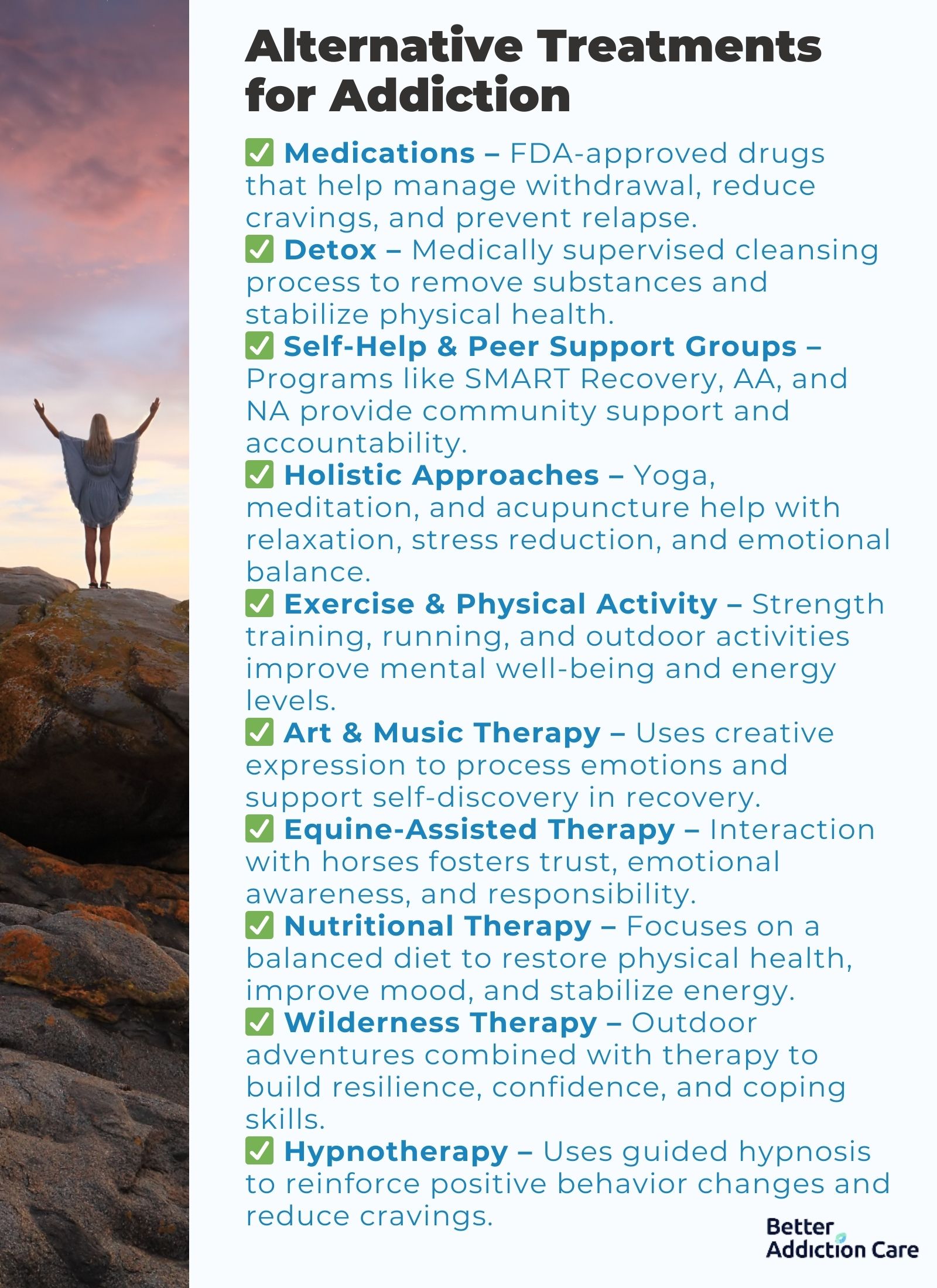
Below are several alternative treatments commonly used in addiction recovery:
-
Medications: FDA-approved drugs that support withdrawal management, reduce cravings, and prevent relapse.
-
Detox: Medically supervised process that removes harmful substances from the body and stabilizes physical health.
-
Self-Help and Peer Support Groups: Programs like SMART Recovery, Alcoholics Anonymous (AA), and Narcotics Anonymous (NA) offer peer support, accountability, and structure.
-
Holistic Approaches: Practices such as yoga, meditation, and acupuncture promote relaxation, emotional regulation, and natural healing.
-
Exercise and Physical Activity: Activities like strength training and outdoor therapy improve mental health, reduce stress, and restore energy levels.
-
Art and Music Therapy: Creative outlets that use expressive arts and sound healing to process emotions and foster self-expression.
-
Equine-Assisted Therapy: Involves interaction with horses or other animals to build trust, communication, and emotional awareness.
-
Nutritional Therapy: Focuses on dietary counseling and gut health optimization to restore physical health and improve mood stability.
-
Wilderness Therapy: Combines outdoor expeditions with structured therapeutic activities to build resilience and self-efficacy.
-
Hypnotherapy: Uses guided hypnosis to alter behavior patterns and reinforce motivation for recovery through subconscious suggestions.
What Are the Benefits of Addiction Therapy?
The benefits of addiction therapy include comprehensive improvements in an individual's well-being by addressing the multifaceted challenges of substance use disorders. Scientific research supports the efficacy of addiction therapy in promoting recovery and enhancing quality of life. For instance, studies have demonstrated significant reductions in substance use and improvements in personal health and social functioning among patients undergoing treatment.
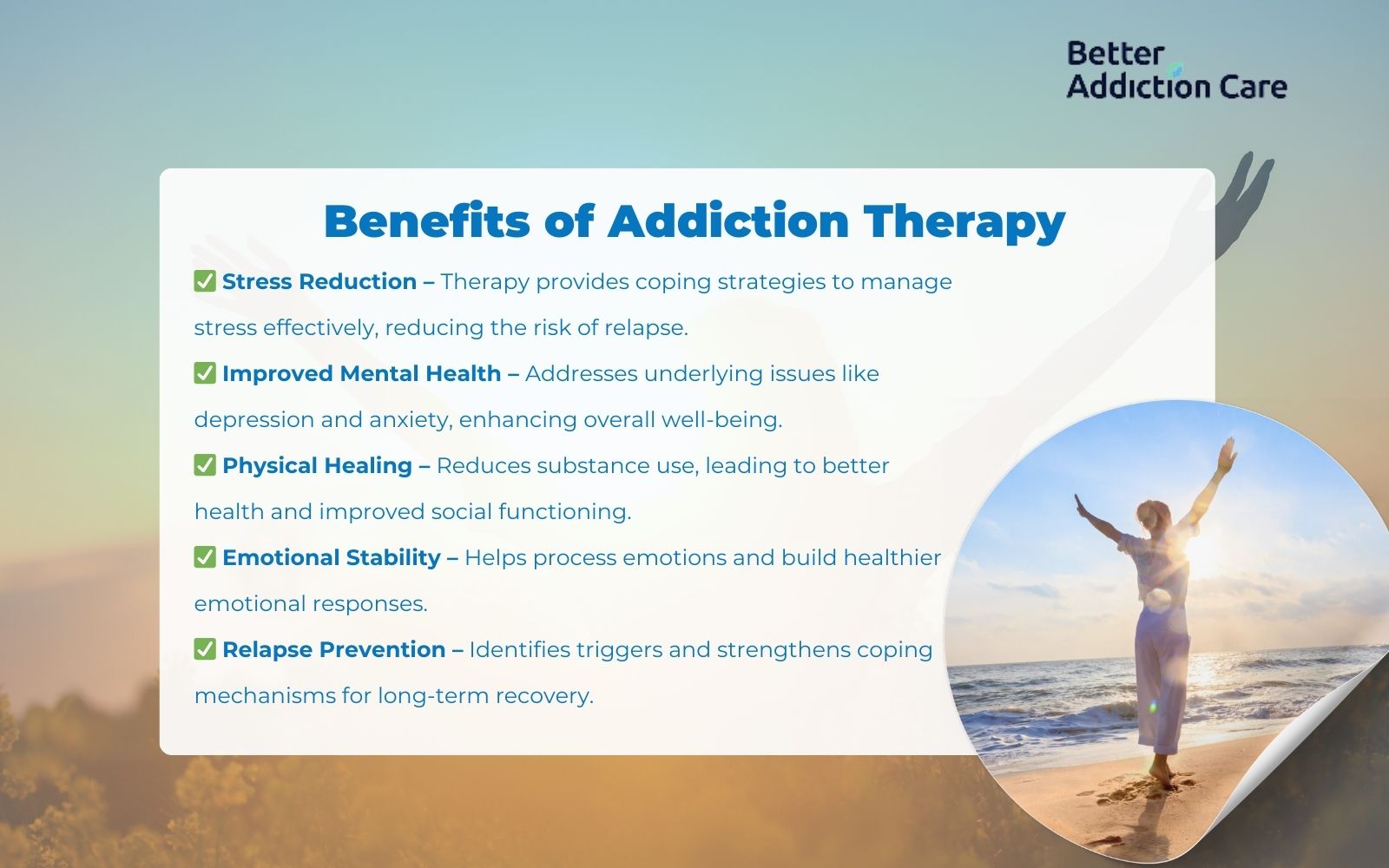
Below are several key benefits:
-
Stress Reduction: Therapeutic interventions equip individuals with coping strategies to manage stress effectively, reducing the likelihood of relapse.
-
Improved Mental Health: Addressing underlying psychological issues such as depression and anxiety through therapy enhances overall mental well-being.
-
Physical Healing: Engagement in therapy has been associated with significant reductions in substance use, leading to improvements in physical health and social functioning.
-
Emotional Stability: Therapy helps individuals process emotions and develop healthier emotional responses, contributing to greater emotional balance.
-
Relapse Prevention: By identifying triggers and developing coping mechanisms, therapy plays a crucial role in preventing relapse and sustaining long-term recovery.
What Are the Challenges of Addiction Therapy?
The challenges of drug addiction therapy are rooted in both internal and external barriers that impact an individual's ability to engage in and complete treatment successfully. These challenges must be recognized and addressed to improve outcomes and support sustained recovery. Below are the most common obstacles individuals face:
-
Relapse Risk: The potential to return to substance use remains high, especially in early recovery, due to environmental triggers, stress, or unresolved emotional issues.
-
Emotional Resistance: Many individuals struggle to open up in therapy, confront trauma, or accept the need for change, making it difficult to fully engage in the therapeutic process.
-
Accessibility Issues: Geographic location, lack of transportation, or limited availability of specialized services prevent individuals from receiving consistent and timely care.
-
Financial Barriers: High treatment costs, limited insurance coverage, or out-of-pocket expenses make therapy unaffordable for many people seeking help.
-
Social Stigma: Fear of judgment or discrimination from family, employers, or society discourages individuals from seeking or continuing treatment.
Is Group Therapy Effective for Addiction?
Yes, group therapy is effective for addiction treatment. It leverages peer accountability, shared learning, and emotional support to foster recovery. The natural tendency of individuals to congregate makes group therapy a powerful tool, sometimes yielding better outcomes than individual therapy. Benefits include reduced isolation, exposure to others' recovery experiences, and integration into a culture of recovery. Additionally, group therapy has been shown to improve recovery rates by up to 50% according to “Substance Abuse Treatment: Group Therapy” published by SAMHSA.
What Are the Differences Between Individual and Group Therapy?
The differences between individual and group therapy are primarily centered around the therapeutic environment and the nature of interactions. Individual therapy offers a personalized approach, allowing for one-on-one sessions tailored to the client's specific needs, facilitating deep exploration of personal issues. In contrast, group therapy provides social reinforcement, enabling participants to share experiences and support each other, fostering a sense of community and shared learning. Both formats have unique advantages and are an integral components of a comprehensive treatment plan.
What Are the Best Therapies for Drug Addiction?
The best therapies for drug addiction are evidence-based approaches that target the underlying psychological, behavioral, and social factors contributing to substance use. These drug addiction therapies are widely recognized in clinical settings and have been proven effective in promoting long-term recovery. Below are some of the most successful therapy options:
-
Cognitive Behavioral Therapy (CBT)
-
Dialectical Behavior Therapy (DBT)
-
Contingency Management
-
Motivational Interviewing
-
Family Therapy
How To Find Rehabs That Offer Addiction Therapy?
To find rehabs that offer addiction therapy, individuals use online tools designed to match them with appropriate treatment centers. Platforms like Better Addiction Care provide a rehab locator that allows users to search for facilities with tailored therapy programs in specific locations.
Whether you're looking for treatment in California, Illinois, Texas, New York, Florida, Massachusetts, Oklahoma, Georgia, or Pennsylvania, our database includes verified centers that provide both inpatient and outpatient therapy programs tailored to your recovery needs. Let us help you find the right support for your journey toward lasting healing.
These tools help narrow down options based on services offered, levels of care, and insurance compatibility, making it easier to begin the journey toward recovery.
Is Addiction Therapy Covered by Insurance?
Yes, addiction therapy is covered by most insurance plans. Under the Affordable Care Act (ACA), mental health and substance use disorder services, including therapy, are considered essential health benefits. This means that insurance providers are required to offer coverage for addiction treatment, which includes individual therapy, group counseling, and behavioral therapies like CBT and DBT. The level of coverage, however, varies depending on the insurance provider, specific plan, and whether the treatment facility is in-network.
To find out whether your insurance covers addiction therapy, it is important to verify your benefits directly with your provider or through a trusted resource.
Can Addiction Therapy Be Done Online?
Yes, addiction therapy can be done online. Virtual treatment options, including individual counseling and group therapy, provide access to evidence-based care through secure telehealth platforms. These programs support the same therapeutic goals as in-person sessions, including behavioral change, emotional regulation, and relapse prevention. Online therapy has been shown to improve treatment engagement and is a flexible solution for those with limited access to in-person care.
How Long Does Addiction Therapy Last?
Addiction therapy duration depends on the severity of the addiction, personal progress, and the treatment approach used. Many structured programs last 30, 60, or 90 days, while some individuals continue therapy for several months or more. Long-term treatment, including aftercare and ongoing counseling, strengthens recovery outcomes by supporting sustained behavioral change and emotional growth.
What Is the Difference Between Individual and Group Therapy?
The differences between individual and group therapy are centered on the format and focus of the sessions. Individual therapy offers a private, one-on-one setting where clients receive personalized treatment and in-depth support. Group therapy, on the other hand, provides a shared environment where participants gain insight from peers, receive social reinforcement, and build a sense of community in recovery. Both formats are effective and used together in comprehensive treatment plans.
How Does Family Therapy Help with Addiction Recovery?
Family therapy helps with addiction recovery by addressing the emotional and relational dynamics that influence substance use. It strengthens communication, rebuilds trust, and provides education about addiction’s impact on the family unit. Involving loved ones in the recovery process enhances accountability and creates a more stable and supportive environment for long-term healing.
What Is the Difference Between Inpatient and Outpatient Addiction Therapy?
The difference between inpatient and outpatient addiction therapy lies in the level of care and structure. Inpatient therapy involves living at a treatment facility with 24-hour support, making it ideal for individuals with severe addictions or complex needs. Outpatient therapy allows clients to live at home while attending scheduled treatment sessions, offering more flexibility for those balancing recovery with work or family responsibilities.
How Does Therapy Prevent Relapse?
Therapy prevents relapse by teaching individuals to recognize high-risk situations, manage stress, and replace destructive behaviors with healthy coping mechanisms. Techniques such as cognitive behavioral therapy help identify the thoughts and triggers that lead to substance use, allowing clients to build long-term strategies for maintaining sobriety and emotional stability. A study by Science Direct titled “Relapse after inpatient substance use treatment: A prospective cohort study among users of illicit substances” have reported relapse rates between 40% and 75% for heroin and other illicit drugs showing the need for ongoing therapy even after inpatient treatment.
Is Addiction Therapy Confidential?
Yes, addiction therapy is confidential. Therapists are legally and ethically obligated to protect client privacy and maintain confidentiality during all sessions. This ensures that individuals speak freely and work through sensitive issues in a safe, secure, and nonjudgmental environment.
Can Addiction Therapy Help with Co-occurring Mental Health Disorders?
Yes, addiction therapy helps individuals manage co-occurring mental health disorders such as depression, anxiety, or PTSD. Integrated treatment approaches address both conditions at the same time, leading to better outcomes and reducing the risk of relapse. According to the Substance Abuse and Mental Health Services Administration (SAMHSA), approximately 9.2 million adults in the United States experience co-occurring mental health and substance use disorders each year. Treating addiction alongside mental health issues ensures that all aspects of a person's well-being are supported throughout recovery.
Related Articles
Treatment Centers in New Jersey








